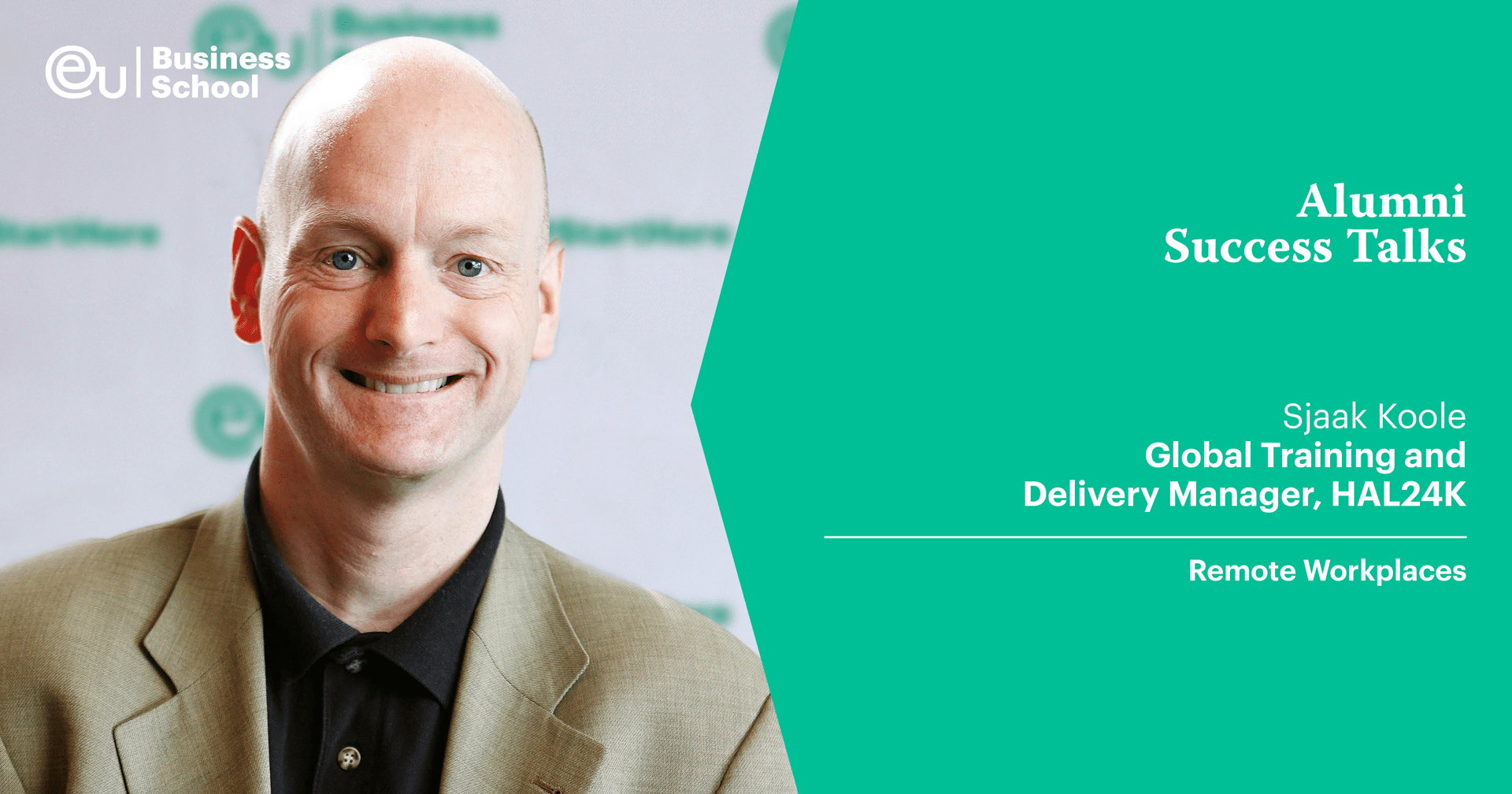Alumni Success Talks: Remote Workplaces by Sjaak Koole
Sjaak Koole graduated from EU Business School in 1997 with an MBA in International Business Management. As if to illustrate his points about remote workplaces, he spoke from his home office in the Carpathian Mountains to an audience of other EU Business School alumni, including some of his former classmates, who tuned in from as far abroad as Indonesia and Brazil.

Sjaak is lively, humorous, and has over 25 years of experience managing teams within the IT/software industry. He began his career working for blue-chip companies, including British Telecom and Unisys, and is now heavily involved in the IT startup scene. After serving as the Alumni Chapter Lead for EU Business School in France and the Netherlands, he is now employed as Global Training and Delivery Manager for international data science company HAL24K.
In his talk, he outlined the five most important considerations for remote workplaces. These are:
1. Staying Healthy
This relies on a combination of things, including making sure you eat well, get enough sleep, exercise, and fresh air, and take time to relax. One of the great things about remote working is that it gives you the freedom to work in your own way. You don’t need to spend all day sitting down. In fact, Sjaak cautions you against this. He tries to run 50km a month, cycle 100km a month, and get outside every single day. It’s very possible, he says, to exercise while still having a gruelling job.
2. Work-Life Balance
The key things needed to maintain a healthy work-life balance are known in Dutch as “the three R’s.” In English, this translates almost as well. You’ve got to factor in:
1. Rest
2. Routine
3. Regimen (Hygiene)
3. Team Management
Effective team management is all about keeping the channels of communication open. Sjaak’s first job after graduating from EU Business School was as the European IT Manager for BT Global Services. There, he was responsible for managing a team split between Amsterdam and Paris, cities that are over 500km apart. Whenever he was driving from one place to the other, he made use of his time on the road by phoning and talking to his teams. He says it’s important for staff to hear from their managers every day, especially when they are working remotely.
4. Office Management
Perhaps unsurprisingly for someone who has worked as an Operational Manager for the past 20 years, this one is Sjaak’s favorite. For him, good (home) office management comes down to three things:
- Having the right furniture. Your starter pack for remote working should include a stable internet connection and a good chair and desk that are the right height to support your back. Sjaak recommends an electronic desk that can be converted from a sitting to a standing position—once again to get you on your feet. He also has a Van Gogh painting he’s very proud of in his home office, and a sofa. Sofas are not typical office furniture, but Sjaak likes them because they promote equal and open business relationships.
- Health & Safety. Every country has regulations regarding health and safety practices, including reasonable adjustments to work equipment for people with issues such as back or wrist pain. This does not change even if your employees are working from home. For example, when HAL24K went remote during the European lockdown, they gave office desks and chairs to all their staff to ensure their spines did not suffer while working remotely.
- Having your own space. It is important that you set up an official “office space” at home. It doesn’t have to be a designated study; any room will do as long as it’s your own space, people know not to disturb you, and there aren’t too many distractions coming from outside. You can always use a Zoom background to make it look more professional when you are on a call!
Speaking of space, Sjaak was recently in a webinar with the Dutch astronaut Andre Kuipers, who has flown on two space missions and spent six months at the International Space Station (ISS). Interestingly, he highlighted some of the similarities between remote working and being resident there:
- Fitness is of paramount importance.
- Staying at the ISS involved spending six months in a confined space where there was limited human contact.
- It requires discipline and management.
- You need to find ways to reduce stress while you’re up there.

5. Technology
- Internet connection. You must make sure you have a stable internet connection, because this is the gateway to communication while you are working remotely. Sjaak recommends investing in fiber broadband because the up and down speeds are the same, and it’s a dedicated connection, which makes it more reliable than a shared supply. One of the attendees added to the conversation that Internet via satellite has also become more affordable when working from true remote and offshore places.
- Sound. If your sound falls away, everything stops (unless, he says, you are doing a mime masterclass!), so it is also worth investing in a good microphone for Zoom calls, etc.
- Camera. These days, cameras are very good, whether you’ve got a handheld camera, a laptop/webcam, or are even just using your mobile phone. Any one of these should be sufficient for everyday calls, unless you need to show something in high resolution. There’s no point investing in a 4K camera, though, if your internet connection is not reliable or your provider is not supporting high bandwidth: the video will be sluggish and might even breakup the audio.
You need all three of the above to work well, and in conjunction with one another, to work effectively from home.
As a manager, it is your job to make sure your team stays connected, so Sjaak recommends making the most of the tools available on applications like Zoom. During his talk, he used polls, the chat feature, and different cameras and angles to make the discussion more interactive.
However, while technology makes remote working easier in many ways, it is not without its complications. One of the audience members raised some concerns about the particular security risks of remote work. Sjaak, who has worked in the technological sphere for more than two decades, gave the following advice on how to keep your data secure while working with remote teams:
1. Train people well and make them aware of the risks; human error is responsible for most of the problems organizations face on this front.
2. Establish a VPN connection to dedicated servers.
3. Store data safely, especially when using The Cloud to hold people’s personal data.
Feeling inspired by Sjaak’s story? Check out the course profile for our MBA in International Business online today.









